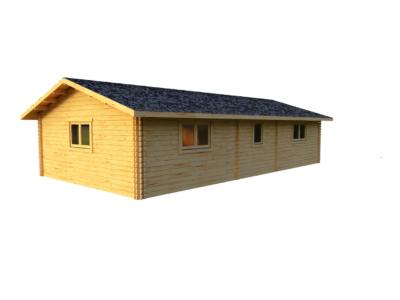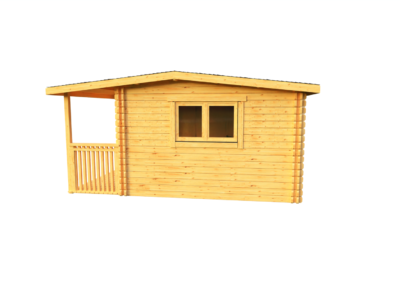Log cabins have become an increasingly popular solution for sustainable living, offering both comfort and style with smart technology and energy-saving features.
Brexit presents both threats and opportunities for the industry. In this article we’ll look at its effects on UK log cabin manufacturing – both positive and negative.
Increased Import Costs
The UK log cabin industry relies heavily on imported materials, and Brexit’s effects have caused import costs to skyrocket. This increase is primarily caused by sterling’s weakening against other major currencies and makes purchasing building materials from overseas more costly for manufacturers; unfortunately this also negatively affects wholesalers, who pass along these additional expenses to their customers.
Additionally, Brexit’s uncertainty has forced multinational enterprises (MNEs) to defer investment decisions and decrease export activities, leading them to reduce total EU service exports by USD 146.8 billion over four years – underscoring its severe economic costs. To mitigate such effects on industry and employment, governments should implement early-warning systems and risk assessment frameworks, in addition to transitional support programs (such as temporary financial assistance or tax relief ) designed to assist firms adapting to changing conditions more easily as well as transitional support programs ( such as temporary financial assistance or tax relief ) that encourage them to maintain export activities during uncertain periods.
Finally, the UK government should seek to negotiate new trade agreements with key trading partners as a means of compensating for reduced access to EU markets. Given its global trade networks position, negotiations must focus on multilateral agreements rather than bilateral ones in order to address reduced EU market access. Ultimately, measures taken should aim at helping businesses manage costs associated with Brexit rather than simply trying to counterbalance its impacts with free trade agreements.
This research contributes to the literature on international law and Brexit by exploring how changes to trade policy and international law can create, shift, or remove trade barriers. This approach differs significantly from previous research, which typically focused on either specific policy changes (Du & Shepotylo 2024) or broad economic trends (Van Assche and De Marchi 2022). This study adopts an expansive conception of uncertainty to examine the effect of Brexit on services exports to the EU. It incorporates trade policy uncertainty, regulatory uncertainty, and market-driven uncertainties so as to capture all aspects that influence multinational enterprises (MNEs)’ ability to export services.
Supply Chain Challenges
The global log cabins market is expanding quickly, thanks to rising disposable income and tourism industry expansion. Furthermore, eco-friendly housing options have seen increasing popularity due to increasing sustainable living trends; further contributing to market expansion in coming years. Industry stakeholders can capitalize on this expansion by adopting innovative designs and eco-friendly construction methods, while sourcing raw materials from ethically managed forests or sustainable sources; this will give them an edge and help attract more customers.
However, Brexit has presented companies that rely on international supply chains with new challenges. Import costs have risen for businesses that rely on EU markets while new tariffs and customs regulations have come into force; availability has decreased and delays in deliveries increased while border crimes such as cargo stealing and HGV theft has also seen an upsurge.
Additionally to increasing exports, the UK should seek free trade agreements with other nations and regions – this may prove particularly advantageous to the log cabin industry which depends heavily on overseas sales. These new trading arrangements may take some time before becoming a reality.
On 23 June 2016 the UK held a referendum to decide to withdraw from the European Union, drawing much criticism from right-wing and conservative hard Eurosceptics, but supported by most voters. Since this vote took place, negotiations between Parliament and Prime Minister over exit negotiations with EU were set to conclude by 31 December 2020; however, due to deadlock between Parliamentarians refusing to back EU’s Withdrawal Agreement which also offered transition periods until end-June but were ultimately turned down by UK.
Increased Administrative Burden
The Brexit referendum resulted in an increase in administrative burdens for many businesses, caused by regulatory uncertainty, disruption to EU-UK trade agreements, and new documentation requirements. As a result of these added costs doing business has become more expensive causing companies to raise prices or relocate production operations outside the UK causing business confidence to decrease significantly impacting hiring and investment decisions.
Brexit has had an especially adverse impact on Britain’s services sectors. In contrast to goods trade, which can be easily transported across borders, services trading involves more intricate arrangements that rely on intangible assets that cannot be transported across borders and therefore more vulnerable to policy change and regulatory barriers than physical goods; as a result of its increasing uncertainty due to Brexit has had a direct negative effect on UK services exports.
While some manufacturers have rebounded from the initial post-Brexit drop in trading volumes, ongoing challenges posed by Brexit remain significant obstacles to sales. Compliance costs associated with new legislation is one of the primary concerns affecting British manufacturers; uncertainty surrounding its effect on UK-EU relations compounded this difficulty by making accessing skilled labour more challenging.
Furthermore, Brexit has opened the UK up to new trade deals outside of the EU. In April 2023, for instance, they joined 11 Asian and Pacific nations under the Comprehensive and Progressive Agreement for Trans-Pacific Partnership with an aim of reducing tariffs on goods while creating more cost-efficient trading environments.
Log cabins can serve a multitude of functions in the garden, and many modern timber buildings feature additional features that make them multi-functional. For instance, some timber buildings come with partitions to divide up the building into two separate spaces – making one area ideal as an office, gym, or wellness retreat. Many also come equipped with windows and doors, insulation, 19mm tongue-and-groove roof and floor constructions, storm braces, fittings etc. for added functionality.
Global Market Growth
The global log home industry is witnessing tremendous expansion due to shifting consumer preferences that reflect larger lifestyle trends. Modern buyers increasingly prioritize sustainability, energy efficiency and customization – leading to many manufacturers adopting eco-friendly construction practices – such as using sustainably sourced timber – while some invest in FSC certifications in order to meet stringent environmental standards and thus meet regulatory demands in various markets globally. This shift not only appeals to environmentally conscious customers but also meets regulatory demands in various locations globally.
Log homes not only boast eco-benefits, but they also possess aesthetic value. Their rugged design evokes feelings of tranquility and connection to nature – ideal for the growing number of consumers seeking health and wellness in their living environments. Plus, this style of building allows easy integration of smart home technology into living spaces – further adding to its charm!
History and culture significance have increased demand for log cabins as symbols of heritage and tradition, while remote work drives consumers towards vacation and permanent homes that provide both functionality and tranquility.
Log cabins and homes have experienced strong revenue growth over the past several years, with an anticipated compound annual compound annual growth rate of 6.7% over the coming decade. This market is highly competitive; several key players compete for customer attention. To stay competitive, companies develop new and innovative products tailored specifically towards meeting consumer preferences.
Even with its present challenges, the UK remains an attractive trading partner for global log cabin industry. Membership of CPTPP should help it maintain access to important regional markets without incurring burdensome tariffs on exports – thus helping ease some pressure off domestic manufacturing sector during Brexit preparations. Nonetheless, more steps must be taken to increase attractiveness as trading partner including streamlining customs procedures and maintaining regulatory alignment between key trade partners.






